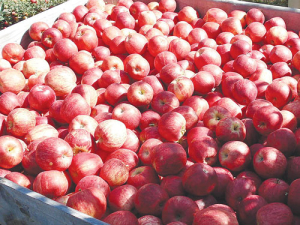NZ Catchment Groups Thrive with ‘Source to Sea’ Approach
The most successful catchment groups in NZ are those that have 'a source to sea' approach.
 NZ Apples and Pears Incorporated will hold a series of grower meetings as part of consultation on the funding of its levy.
NZ Apples and Pears Incorporated will hold a series of grower meetings as part of consultation on the funding of its levy.
A series of apple and pear grower meetings are being held around the country.
These are part of a consultation programme to determine whether growers will continue to fund a levy to support their industry organisation NZ Apples and Pears Incorporated (NZAPI).
NZAPI is legally mandated by the Government to collect a levy from commercial apple and pear growers to fund the support and services it provides as the industry body. A vote of growers is undertaken every six years to either continue or reject this levy.
The current levy for NZAPI expires on 16 January 2025 and during the last few months growers opinions' have been sought by various means - including face-to-face regional meetings, webinars, newsletters, and public notices. In April, a referendum will be held for all potential levy payers to vote on the Commodity Levy.
All apple and pear and growers who grow apples and pears in New Zealand - which are or may be sold for consumption as whole fresh fruit, or sold for resale as whole fresh fruit, or exported as whole fresh fruit - are eligible to vote. Each trading entity is entitled to one vote. Voting will be open from 9am Monday 8 April to 12 noon Friday 3 May 2024, which is taking place online and by post.
If growers decided to continue with the levy, a formal application will be made in May from NZAPI to the Ministry for Primary Industries (MPI) requesting renewal of the Levy Order.
NZAPI says more than 30 years on, the levy continues to be the foundation of what it as an industry body does for the industry.
Agricultural and veterinary product supplier Shoof International has appointed Michaela Dumper as its new chief executive.
Federated Farmers is celebrating following the Government's announcement that young farmers will be able to use their KiwiSaver funds to buy their first home or farm.
The Meat Industry Association of New Zealand (MIA) today announced that Chief Executive Officer Sirma Karapeeva has resigned from the role.
The winners of the 2026 Hawke’s Bay/Wairarapa Dairy Industry Awards were announced at the annual awards dinner held at Copthorne Solway Park in Masterton on Thursday evening.
Environment Southland is welcoming this week’s decision by the Environmental Protection Authority (EPA) to approve the release of Blaptea elguetai, a leaf‑feeding beetle that will help control the highly invasive Chilean flame creeper.
This March, the potato industry is proudly celebrating International Women’s Day on 8 March alongside the International Year of the Woman Farmer, recognising the vital role women play across every part of the sector — from paddocks and packhouses to research, leadership, and innovation.

OPINION: A mate of yours truly reckons rural Manawatu families are the latest to suffer under what he calls the…
OPINION: If old Winston Peters thinks building trade relations with new nations, such as India, isn't a necessary investment in…